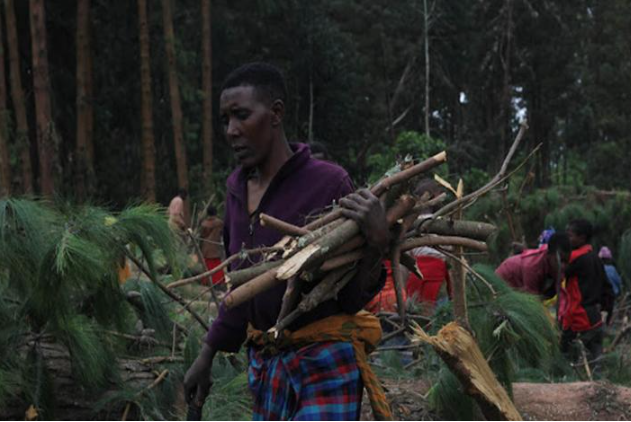Residents living near the Olmotonyi Training Forest in Arusha Region have expressed their gratitude to Sokoine University of Agriculture (SUA) for providing them with firewood and agricultural areas, which has helped them generate income to support their livelihoods and families for many years.

Residents coming out with firewood from the harvested forest.
The gratitude was expressed by the residents while speaking to journalists within the forest owned by SUA, which is specifically used for practical training for students pursuing various forestry degrees at the university
Speaking while collecting firewood in the currently logged area, Ms. Mami Lowasa mentioned that since she was born, she has seen her parents entering the Olmotonyi Forest to farm in the areas where the management of the training center allows agricultural activities to take place
Ms. Mami Lowasa speaking with journalist (not in photo) at Olmotony Training forest during firewood collection
“Looking at this city of Arusha, many low and middle income citizens depend on agriculture to sustain their lives, but there are very few agricultural areas. However, good relations between SUA and the community have enabled many citizens to obtain areas to grow various crops, especially corn, beans and vegetables within this forest in open areas that have been harvested for timber and have small trees planted,” explained Ms. Mami.
On his part, another citizen, Julias Sumayaki, after both his parents died, was left with three younger siblings to care for and educate, but he has no job or farm to cultivate to meet his needs and those of the family left by his parents.
“I have no good word of thanks that I can say to express my joy and gratitude to the leadership of SUA for the great help we receive after being allowed to get firewood from the remains of harvested trees. This forest is our life, me and my younger siblings, but also many young people here in town,” said Mr. Sumayaki.
He added that through this forest I was able to get firewood for use at home and with my younger siblings but also others to go sell in Arusha town and get money that enabled me to educate my younger siblings left by my parents but also get my needs right at home. Indeed, this forest is a savior for us.
Speaking about the contribution of Olmotonyi Forest, the Manager of the Forest Training Center, Mr. Said Kiparu said that in addition to providing opportunities for the community around the forest to get firewood and agricultural areas, these citizens have been providing great cooperation in providing various information about forest poachers.”
The manager of the Olmotonyi Forest Training Center, Mr. Said Kiparu, spoke to journalists at the station to see the work done by the center in providing practical training to SUA students.
The community sees the benefit of this forest and sees it as their own because we allow them to cut firewood, especially branches in areas where we have harvested timber logs, but also when we finish harvesting and plant other trees, we give them the opportunity to grow small crops, especially round potatoes and vegetables when the trees are small and they participate in taking care of them while caring for their crops, explained Mr. Kiparu.
The Principal of the college of Forestry, Wildlife and Tourism, Dr. Agnes Sirima, said that giving the people around Olmotonyi Forest the opportunity to get firewood and cultivate is a good contribution made by the College to the community as neighbors around the forest.
In this way, we build good relationships with the surrounding community and make them learn about the importance of forest conservation but also become good forest guards and thus reduce challenges of burning unlike in the southern highlands where fire disasters destroy many planted forests and cause losses to stakeholders, explained Dr. Sirima
The principal of the college of Forestry, Wildlife and Tourism, Dr. Agnes Sirima (center), spoke to journalists about the forest and to her left is SUA’s Communications and Marketing Officer, Ms. Suzana Magobeko.
The college principal said that in addition to these benefits, some of the communities around the forest have also found employment and others do various casual jobs that earn them money to support their lives while also learning all the steps of planting, caring for, harvesting and processing tree logs to get timber.
A sign showing the start of the Olmotonyi Training Forest

